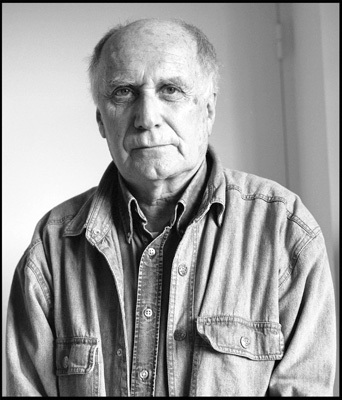François Maspero facts for kids
Quick facts for kids
François Maspero
|
|
|---|---|

François Maspero
|
|
| Born | 19 January 1932 |
| Died | 11 April 2015 (aged 83) |
| Nationality | French |
| Occupation | Author, journalist |
| Political party | French Communist Party |
| Parent(s) |
|
François Maspero (born January 19, 1932, in Paris – died April 11, 2015, in Paris) was a French writer and journalist. He was most famous for publishing many important books, especially those with leftist ideas, in the 1970s. He also worked as a translator, changing books from one language to another. He translated works by famous authors like Joseph Conrad and John Reed, who wrote Ten Days that Shook the World. In 1990, he won an award called the Prix Décembre for his book Les Passagers du Roissy-Express.
Contents
Early Life and Family Background
François Maspero was born in 1932. His family was very interested in culture and learning. Many of his relatives were well-known scholars. His parents were also part of the French Resistance, a secret group that fought against the occupation of France during World War II.
His father, Henri Maspero, was a professor who studied Chinese culture. Sadly, he died in a concentration camp called Buchenwald. However, François's mother survived another camp called Ravensbrück concentration camp. His grandfather, Gaston Maspero, was a famous Egyptologist, someone who studies ancient Egypt.
In 1955, when he was 23 years old, François Maspero opened a book store in an area of Paris called the Latin Quarter.
Creating Éditions Maspero
In 1959, during the Algerian War, François Maspero started his own publishing company. He named it Éditions François Maspero. He worked with Marie-Thérèse Maugis and later with other partners.
Publishing Books on the Algerian War
Their first books focused on the Algerian War. They shared an anti-colonialist view, meaning they were against countries controlling other lands. They also questioned the French Communist Party's old-fashioned ideas.
Maspero published The Wretched of the Earth by Frantz Fanon in 1961. This book was about the struggles of people under colonial rule. The French authorities tried to censor it, but Maspero still published it. The book even had a special introduction by the famous writer Jean-Paul Sartre.
He also published other stories about Algeria, including reports on how the French Army used torture. These books were also censored. Because of his brave publishing choices, Maspero faced legal problems and even had his office targeted by bomb attacks.
Expanding the Publishing House
Maspero also republished important books like Les Chiens de garde and Aden Arabie by Paul Nizan. These books also had introductions by Jean-Paul Sartre. He then started a magazine called Partisans, which was published until 1973.
Many important writers became known through Maspero's collections. These included Régis Debray and Bernard-Henri Lévy. Georges Perec also published his first writings in Partisans.
In the 1960s, Éditions Maspero paid special attention to problems in the Third World. This term refers to developing countries. They also focused on neo-colonialism, which is when powerful countries still influence former colonies. They published books by leaders like Che Guevara.
In 1972, Maspero published Cruel hand on Cameroon by Mongo Beti. This book was about Cameroon's journey to independence. The French government, at the request of Cameroon, censored this book. In 1975, he republished a classic book about the anarchist movement in France. From 1967 to 1982, he published a popular series called "Petite Collection Maspero."
In 1983, the Maspero publishing house changed its name to Éditions La Découverte. This company was later bought by larger media groups.
Later Career and Recognition
After 1983, François Maspero continued his work. In the 1990s and 2000s, he wrote many reports for the French newspaper Le Monde. For example, in 2001, he wrote a long story about a summer he spent on the Algerian coast.
In 2009, to celebrate the 50th anniversary of Éditions Maspero, an exhibition was held in his honor. It was called "François Maspero et les paysages humains" (François Maspero and human landscapes). This exhibition took place in Lyon, France, at the Musée de l'Imprimerie (Printing Museum). A book was also published to celebrate his life and work.
Notable Works by François Maspero
- 1984 - Le Sourire du chat, also known as Cat's Grin
- L'ombre d'une photographe, Gerda Taro, published in 2006
- 1990 - Les passagers du Roissy Express, with photos by Anaïk Frantz. This book was also translated into English as Roissy Express: a journey through the Paris suburbs.
Selected Books Published by François Maspero
- Frantz Fanon's The Wretched of the Earth (1961)
- Fernand Oury and Aïda Vasquez. Vers une pédagogie institutionnelle (Towards an Institutional Pedagogy), 1968.
See also
- Censorship in France
 | Chris Smalls |
 | Fred Hampton |
 | Ralph Abernathy |

